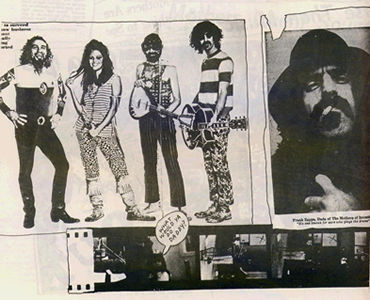
Strapping on four extra members, they recorded ABSOLUTELY FREE and headed for a six month glut at New York's Garrick Theater. "Cleverly animated, pornographically delightful," these shows lubricated Zappa's talent for portraying the Great American Atrocity, abetted by band, audience, and a gory array of props.
"We make a special art in an environment hostile to dreamers." F.Z.
New York, in the Purple Haze Summer of '67: The Mothers record the scathing WE'RE ONLY IN IT FOR THE MONEY (with Zappa replacing Wilson as producer). It spewed glady all over the Sargeant Pepper Syndrome, and, consequently, its release was delayed 11 months by the legal staff of a certain popular rock group, Zappa's first solo LP LUMPY GRAVY was next (via a 13 month delay for legal problems between Verve and Capitol Records).
That September ('67), The Mothers attacked London for the first time, assisted by a rented surrogate SUZY CREAMCHEESE for PR purposes. They played the Albert Hall using ten members of the London Symphony Orchestra who, in response to Mothers Music, became nauseous and wept.

Bottom, Photos taken during the recording of Brown Shoes Don't Make It, T.T.G. Studios, Hollywood, November 1966. The girl who said "What would you do, Daddy?" is Herb's daughter Lisa.
Far left, In wild west boots and crazy pants, Claudia Cardinale poses with the M.O.I. for The London Times.
NEW YORK POST, THURSDAY, MAY 25, 1967
Across the Footlights
By Jerry Tallmer
'Absolutely Freeee'
An entertainment by The Mothers of Invention, as presented last night by Herb Cohen at the Garrick Theater [...] by Sherwood, lighting by Buddy [...] L. A. The mothers: Frank Zappa, Don Preston, Ray Collins, Jimmy Carl Black, Bunk Gardner, Billy Mundi, Roy Estrada
Fathers of LOUD
The Mothers of Invention are seven young men of saturnine, malevolent, and hairy aspect. They are an electronic-rock, hard-rock group of musicians who put on an air of having as much nonchalant contempt for their audiences as for society in general.
Their stuff is lound enough to blow your brains out, along with your eardrums. "Too loud?" one of them enquired from the stage last night at the Garrick Theater. "Can you hear the words?" No, said several of the public. "That's good, said the mother. Then he lifted the mike up next to a loudspeaker to send the place screeching with feedback. A nice little trick for Auschwitz, thought this captive member of the fifth row.
The show is variously entitled "Pigs and Repugnant" and "Absolutely Freeee." It features miniskirted usherettes, psychedelic lighting, a good bit of defecatory and expectorant humor, animus toward Ronald Reagan, parodies of The Supreme and Lesley Gore, a smattering of Stravinsky, the chewing of turnips, the dropping of cigaret butts to the floor, and an interestingly profane romance between a plastic doll and a common tropical fruit.
Has the Beat
This apart, the music remains—and the musicianship—which just possibly is brilliant verging on great. It may beat your brains out but it has [...]
THE NEW YORK TIMES, THURSDAY, MAY 25, 1967
Mothers of Invention at the Garrick
Written and Composed by Frank Zappa
The Program
ABSOLUTELY FREEEE, a musical. Music and lyrics by Frank Zappa. With the Mothers of Invention: Mr. Zappa, Don Preston, Ray Collins, Jimmy Clark Black, Bunk Gardner, Billy Mundi and Roy Estrada. Presented by Herb Cohen. At the Garrick Theater, 152 Bleecker Street.
By DAN SULLIVAN
"ABSOLUTELY FREEEE," which opened at the Garrick Theater last night, will cost you threeee dollars a ticket. Whether you find the money well-spent will depend a great deal on how old you are, or wish you were.
Although a good many strange and wonderful things were promised by the advance publicity for this show under its former name, "Pigs and Repugnant," it turns out to be nothing more nor less than a concert by a seven-man group called The Mothers of Invention.
*
The Mothers, as we will call them for short, are familiar to and worshipped by the Flower Generation. The Pepsi Generation may find them a little hard to take.
Let us say that the Beatles are as far-out a group as you have encountered up to now. The most striking difference between the two groups is not in their work but in their approach to their work—the Beatles' basic desire to please an audience versus The Mothers' basic distrust of one (or at least of the one that attended the opening).
The distrust is seen in the super-ironical introductions of Frank Zappa—"Here's another hot little number . . . "—and in the cool diffidencewith which the group goofs around between numbers. The audience has the feeling that if it is not very careful, the boys might just say, "Who needs this scene?" and walk out.
Their music is also, more often than not, frankly hostile—both in its headachey volume and in those lyrics that you can make out amid the roar.
"Across the nation . . . black and white . . . TV . . . trading stamps . . . high-school . . . " The targets keep popping up, but whether they are being hit with any degree of verbal accuracy or style is impossible to discover without a libretto.
As pure sound, though, this approaches genius. From an electrified kitchen of percussion, saxes, guitars, flutes, etc., they produce a thick, black sound shot through with odd treble sunbursts and pinwheels—the exact aural equivalent of the nervous ever-changing abstract projections flashing on the screen behind them.
*
Beneath the Lenin beards and the John-the-Baptist hairdos, these are fine musicians—never better (and surely never more attractive) than when they are parodying the rock'n'roll numbers of an earlier generation.
They are of an age that can honestly think of Elvis Presley with nostalgia. There is something oddly sweet in their parody-homage of "Hound-Dog," and lesser-known of yesterday's hits, which they made fun of in a way that cannot disguise their honest affection for the Old Masters.
Whether their show at the Garrick will make any new friends for the Mothers—or whether they really want any—is hard to say.
If they are interested in attracting a wider audience, it might be suggested that they consider the uses of silence, as well as volume, to attract and hold an audience's attention.
With the best will in the world, one's attention does tend to click off, like a thermostat, under a steady barrage of triple-forte, no matter how brilliantly achieved.
At such moments, the Mothers' music becomes simply a background roar—as it would on the subway—and the listener finds himself paying more attention to what is on his his mind than what is in his ears.
If what is on his mind is spiritual enough—how to attain the inner light, say—then the music of the Mothers can be considered devotional. But the trouble with the Pepsi Generation is that most of us are more likely to be wondering what we did with our car keys.
the village VOICE, June 1, 1967
THEATRE: ABSOLUTELY FREEEEE
A musical by Frank Zappa, with The Mothers of Invention, presented by Herb Cohen at the Garrick Theatre, Direction uncredited.
by Diane Fisher
Theatre, it's not: "Absolutely Free" is a concert pure and simple, but if the Mothers of Invention want to down it as theatre that's okay with me. I'm perfectly happy to hear good music, no matter what it's posing as.
The seven Mothers, if anyone doesn't know it by now, amalgamate "serious" music, jazz, and rock into a sardonic, electronic eclecticism. Mother-in-charge Frank Zappa, the composer-arranger, plays guitar and sings (with Ray Collins and Jim Black). There is a one-man wind and brass section—Bunk Gardner on bassoon, piccolo, flute, clarinet, and soprano, tenor, and alto saxes. And a vast rhythm section—Black, Billy Mundi, and sometimes Don Preston, percussion; Preston, piano, organ, and related and unrelated instruments; Roy Estrada, bass; and singer Ray Collins on occasional tambourine. Everything that possibly can be electrified is, including the wind-brass section. It works, and particular well on jazz.
Zappa and other of the Mothers have a jazz background, and jazz doesn't sell too well these days, but I wish they would sneak in an all-jazz evening now and then. I suspect the extent of their electric instrumentation is unprecedented. It's new, and it's good.
Zappa looks nasty, and when he comes on stage you brace yourself for a hostile assault; the group follows, you prepare your ears for deafening hate bleeps. They don't come. Zappa is relaxed, gentle, his rage is pressed into a fine-tuned irony. (Try to ignore it if he asks you if the music's too loud, then puts the voice mike, during an electric soprano sax solo, to the big vertical speaker. I've been at concerts that literally left my ears ringing for two days. This wasn't one of them.) The sound is different from anything else, energetic, often loving.
The Mothers' image is deceiving. Their scandalously unrespectable appearance must be pretty forbidding for post-puberty generations, yet in age and frame of reference the Mothers are at least a generation older than the hippies who compose most of their following. A few of their targets date back to the '40s (Avalon Ballroom-style emceeing), some to the '50s (rock'n'roll of that era).
Their attitude hasn't much to do with age. It might be called surrealistic enlightened. Subject matter ranges from plastic people ("you think we're talking 'bout someone else") to the President ("he's been sick") to Donovan (some wicked epatering that should outrage the coterie).
But most of what can be said about the lyrics can be ascertained only from their new record. The "Absolutely Free" album was distributed absolutely free to critics, but presumably it won't be any more free in stores than tickets to the show—$3—are at the box office. At any rate, the unbalanced sound system on stage renders the lyrics unintelligible. Paradoxically, however, although this second record is better than the Mothers' "Freak Out" album, neither hints at how good the group is in person. One hears everything all at once on the records and somehow the sum doesn't amount to much.
In person, one can't assimilate all the different musical and verbal things going on, and more imaginative, varied light-works would reinforce this. I have a theory that mixed-media events work only if so many absorbing things are happening simultaneously that one is missing something exciting all the time, and this seems to apply to the Mothers in person. And from this angle, maybe "Absolutely Freeeee" is theatre after all.
INTERZAPPA TONES
M.G.M. knows how to be nasty. First they wouldn't have any group of performers called "The Mothers." Obviously nasty. On the other hand you might notice, those of you with a line eye for detail, that on record jackets and in their publicity the word "Mothers" gets larger and "of Invention" gets smaller. Very nasty. Second—after contracting the Mother's latest album—ABSOLUTELY FREE—written, composed, directed and collaged by Frank Zappa—M.G.M. took issue with the libretto. M.G.M.'s 19th century bias for printed word efficacy led them to exclude the words from the album, though you hear the same words sung. Nasty, nasty . . . shades of Arnault Daniel.
But I'm dragging my heels
In London last week (see John Peel's PERFUMED GARDEN, this issue) Frank Zappa offered this oratorio for publication in International Times. We accepted gleefully. Frank wrote the forward and notes specially for IT.
Do you get it now? Frank Zappa is nice and M.G.M. is nasty.
There's a guerilla attack in Haiti forecast. Algeria and Morocco will be shedding each others blood by the end of the year over low grade iron ore in land located, barely and Algeria—according to an unpublished secret General Electric computerised economic cost effectiveness survey paid for by the Algerian government.
A record turnover in equities. Frank Zappa records a song with Lenny Bruce—called Don't come in me"—for his new album. International Times readers get first international peek at printed word version of ABSOLUTELY FREE. International Times gets an ad from M.G.M.—fodder 'or our overdraft—and M.G.M. hopes we like money enough to cool it. Nasty. Nasty all around.
Others would say: This is the all-universe energy in continual matter and life transformations. For my part:
Read Frank Zappa's words now!
Hear Frank Zappa's sounds too!
Communication is the sharing of conscious experience.
Frank Zappa, Frank Zappa . . .
Intellect is consciousness of energy. Artistry transfers energy: the end is sharing.
ZAP ZAP ZAPPA: read him, see him, hear him, if you don't have the time. The Mothers of Invention have released two albums—the other is FREAK OUT—and have had two howing successes.
Herbie Cohen, the Mother's manager who wears ready-made Turkish business suits, clucks "300,000 L.P.'s sold without a minute of radio time."
Frank Zappa's songs recall a naked lunch of the American high school scene in the fifties—FLASH NASTY EAST GEORGIA MESS COVERS HERSELF WITH CHOCOLATE SYRUP TO ATTRACT VEGATABLES. DOOT DOOT DOOT . . .
BILL LEVY
Melody Maker
August 26, 1967
Have you seen your Mother, baby? Or is it Suzy Creamcheese? In fact it's boss Mother Frank Zappa, leader of America's own Mothers Of Invention who'll be in England sending up the nation in their own freaky way in September. Negotiations are going ahead for ten members of the London Philharmonic Orchestra to join the Mothers in their only British concert which will take place at London's Royal Albert Hall on September 23.
Mother Frank Zappa was in London last week and he told the MM: "We'll come into London about a week before the concert to do some promotion and things. I may bring six, eight or fifteen Mothers with me—it just depends how many cats want to come to England."
Promoter Tony Secunda told the MM on Monday: "The group are flying in 1000lbs of equipment. They're bringing in a new member of the group, Motorhead, and they may bring the original Suzy Creamcheese, and another chick called Mother Meat."
The group's second album "Absolutely Free" is to be issued by MGM in October.
Sunday Mirror
24 SEP 1967Peeps, bops . . and Suzy Creamcheese
MOTHERS STUN 'EM
By BERNARD McELWAINE
It was probably the weirdest, hippiest, most psychedelic—frankly, way-out—happening that London has endured since it started swinging.
It was created by an American musical (in the loosest sense) group called the Mothers of Invention.
Complete with a decorative young woman called Suzy Creamcheese, they bombarded London's Albert Hall (of Arts and Sciences) with sound last night . . .
Peeps, pauses, scratches, bops, hisses and shrill, sharp noises belted out from a frightening assortment of electronic gear as coloured spotlights swept the stage.
His voice
The Chief Mother is a gentleman called Mr. Frank Zappa.
He speaks in a pleasant, well-modulated voice softer and more soothing than some of his music.
Dressed like his colleagues in clothes apparently grabbed from a burning warehouse, his profuse hair flowing in Biblical style, Mr. Zappa did not pull any punches.
He told the audience—who, unlike the music, did not fill the hall:
"I will recite the lyrics of this song before the band starts because you won't be able to hear them when they do. You will hate it."
Sometimes the music built up a mental picture of a tin convenience being attacked by whistling banshees armed with rubber hammers.
It seems that Mr. Zappa was right. His reception was less than rapturous.
Then he said: "You will find it repugnant."
Right again.
His picture
Perhaps the bombardment just stunned the audience into silence.
Or, as Miss Creamcheese rather aptly put it: "Perhaps you are not ready for this kind of music yet."
Not that audience reaction really worries the Mothers.
Mr. Zappa's associates send out photographs of him sitting nude on a lavatory. This may be a subtle comment on what he thinks of those who come to hear him.
MOTHERS of INVENTION: best rock sound since Beatles!
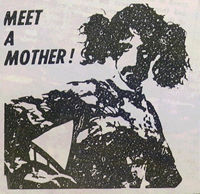
Far below left, F.Z. goes "dressy-dress" during 1967 glitter shortage.
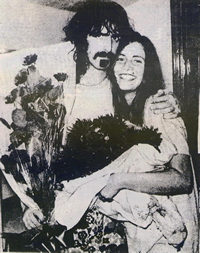
Near below left, F.Z. with Imported S. Cheese P.R. replica.
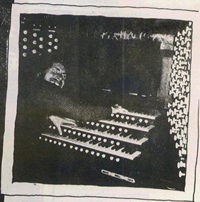
Directly right of above, Don Preston actually playing Louie Louie on the Albert Hall pipe organ.
Mon., Mar. 18, 1968 Los Angeles Times
More Polemics From Pop Satirist
PETE JOHNSON
Their first album, now a couple of years old, was fairly routine by later standards. The jacket was an oddly tinted pink and blue and yellow and black thing with the words "Freak Out!" encapsulated in a thought balloon. Next came "Absolutely Free," a double jacketed creation with each surface seemingly at right angles to each other surface. Their latest, "We're Only In It for the Money," surpasses both for incredibly imaginative humor. It is an inverted parody of the Beatles' "Sgt. Pepper's Lonely Hearts Club Band," a perfectly executed takeoff. Along the way, their albums have bannered such thought provoking slogans as "Kill Ugly Radio," "You Must Buy This Album Now, Top 40 Radio Will Never Play It" and "The Present Day Composer Refuses to Die." The group is the Mothers of Invention, spearheaded by Frank Zappa.
Zappa is a brilliant musician with a flair for satire. Unfortunately, he tends to do things a couple of years before people are ready for them and often so many ideas into such brief musical space that they get lost in the confusion. That first LP (all are on the Verve label, by the way), a two-record set, anticipated many of the strange rhythmic "innovations" of the last album by the Rolling Stones, "Their Satanic Majesties Request."
Additionally, their record debut offered a 6-minute plus song called "Trouble Every Day," a deadly serious collection of thoughts inspired by the Watts riots whih has even more topical value today. Then there were a number of tongue-in-cheek resurrections of the rock'n'roll of the 1950s which showed as much sympathy as meanness.
For his second album, Zappa demonstrated that is as familiar with Stravinsky as he is with Don and Dewey in a program which took some roundhouse swipes at the excesses of society, not the simple vices on which many pop musicians have pounced (love of money and wars, lack of communication), but at topics such as sexual fantasies and drunken revels which aren't revels. The Stones also apparently picked up on a song called "America Drinks and Goes Home" for the last album, which contains an inferior imitation.
Now comes No. 3, a hilarious visual evocation of "Sgt. Pepper" which is sometimes funny and sometimes grim inside.The Mothers attack hippies, the San Francisco scene, motherhood and fatherhood, childhood, drugs, flower people, making records, police, fashions and on. "This whole monstrosity was conceived and executed by Frank Zappa as a result of some unpleasant premonitions August through October, 1967" proclaim some small capital letters almost hidden among the lyrics inside the album. Along with the visual nod at the Beatles, Zappa takes them on in the structure of a couple of super-contemporary songs. One, "Mother People," pokes fun at the Beatles' odd musical transitions by using the sound of a phonograph needle to "unite" two dissimilar melodic sections, much as the Fab Four used radio static to connect parts of "I Am the Walrus."
The record largely is a series of polemics, but Zappa's barbs are witty enough to make his messages entertaining ("Unbind your mind/There is no time/To lick your stamps/And paste them in/Discorporate/And we will begin . . . Wah Wah/Diamonds on velvets on goldens on vixen/On comet and cupid on donner and blitzen/On up and away and afar and a go-go . . . "). Zappa is pop music's bravest iconoclast and perhaps its brightest. His next album, which has been held up for nearly a year through a technical dispute, is a full-length symphony called "Lumpy Gravy."
Rolling Stone/June 22, 1968
RECORDS:
Lumpy Gravy, Frank Zappa (Verve V6 8741).
Lumpy Gravy is the most curious album Frank Zappa has been involved in to date, and in many ways the music doesn't make it; as it says on the cover, "a curiously inconsistent piece which started out to be a ballet be probably didn't make it." The record was recorded in February of 1967, and Zappa conducts the "Abnuceals Emuukha Electric Symphony Orchestra and Chorus," which is made of stray Mothers and some of Hollywood's top musicians. On the back of the album we are asked by Zappa, "Is this phase 2 of We're Only In It For The Money?" but Lumpy Gravy is hardly a sequel in quality or kind to Money, although it does share some thematc material with the later Mothers' group.
Lumpy Gravy carries to an extreme the protean, fragmented musical approach that Zappa favors, but on the whole the work is rather inert. The composition is liberally garnished with dialogues about everything from living in drums to pigs with wings, but most of these spoken sections seem rather artificially forced. There are several jabs at surfing music, and the record closes with an instrumental version of "Take Your Clothes Off When You Dance" that could have been arranged by the Ventures. In contrast some sections of Lumpy Gravy are so extremely chromatic that they verge on "atonality;" these passages are usually scored for strings and/or woodwinds, although towards the end of the second side an atonal passage for wind instruments is incongruously accompanied by a studio drummer.
Parts of Lumpy Gravy break down into cliched lush string writing, while other parts abound in burps and bits of electronic music not unlike sections of "The Chrome Plated Megaphone of Destiny."
Yet in spite of its varied tricks, Lumpy Gravy does not come to life; it is a strangely sterile recording, as though all the studio musicians reading their music could not do what a batch of well-rehearsed Mothers can do. Missing are the songs and the energy of the Mothers with all their casually tossed off mistakes vocally and brilliance musically; furthermore what Zappa has lost by not using the smaller Mothers he has not really gained back by using a huge orchestra. The texture of the music (and the scoring of the instruments, for that matter) is surprisingly conventional and even boring, especially if one is familiar with Zappa's love of burps, aimless dialogue and certain kinds of electronic music.
Nevertheless Lumpy Gravy is an important album, if only because Frank Zappa is one of rock's foremost minds. This album, recorded well over a year ago, demonstrates the problems that serious rock as a whole faces, as well as compositional limitations (as of a year and a half ago) of one of serious rock's leading voices. Lumpy Gravy can hardly be called successful, yet it points the way towards more integrated, formal protean compositions such as Zappa's masterpiece We're Only In It For The Money. It might be said that Zappa makes mistakes that other rock composers would be proud to call their own best music; Lumpy Gravy is an idiosyncratic musical faux pas that is worth listening to for that reason alone.
JIM MILLER
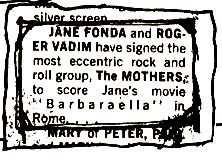
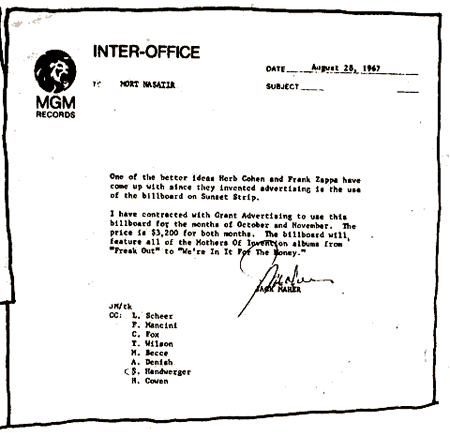
LIFE
Music that's hooked the whole vibrating world
THE NEW ROCK
Plato made the statement that "necessity is the mother of invention" over 2,000 years ago. Thomas Edison responded with the electric light and Frank Zappa responded with The Mothers of Invention on Mothers Day, 1965. He is eager to have the young survivve society's plagues of plastic robots, ugly radio, false morality. He assumes the role of musicologist, psychologist and sociologist. He writes songs called America Drinks and Goes Home, Are You Hung Up? and Who Are The Brain Police? Conglomerates of humor, satire, chance, nonfiction and the grotesque, punctuated with snorts, oinks and bongs, sprinkled with bits of Motown, Sacco and Vanzetti, R & B, Rosemary de Camp, Stravinsky. "We're presenting a chemical monstrosity not really a panacea. But it is a useful household preparation something like ammonia." In the beginning of a song he will demand the following: "4/4 for a certain number of bars, then 17/8 for three bars, to 22/8 for one bar, all played so fast and so tight you don't know what time it is." On stage there is the "possibility that anything can happen." Dolls are mutilated. A gas mask is displayed. A bag of vegetables is unpacked and examined. There are spaced intervals of "honks" and suddenly The Mothers perform Dead Air. They stop, sit down and ignore the audience. Zappa might get a shoeshine from Motorhead, the percussionist. They keep this going for as long as it takes the audience to become unsettled, uncomfortable and angry. Then Zappa calmly approaches the mike and says, "It brings out the hostilities in you, doesn't it?"
"There is no undertaking more challenging, no responsibility more awesome than being a Mother."
Richard M. Nixon
"Thanks a lot, Dick." F.Z.
Constantly transmutting membership, repertoire, and sound, The Mothers (in the process of escaping from Verve), released CRUISING WITH RUBEN & THE JETS and MOTHERMANIA (the only authorized re-packaging of golden oldies)
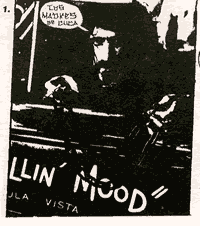
1. Neo-Pachuco S&M style photo taken on the set of The Monkies T.V. show.
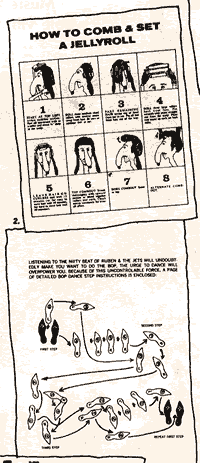
2. Two examples of Fine Art from that period.
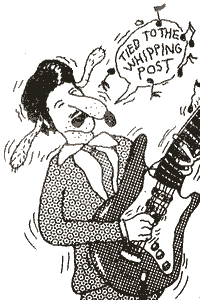
POP
CRUISING WITH RUBEN & THE JETS—Mothers of Invention, Verve V6-5055X (S)
One of the great put-on records of our time, this album has the Mothers of Invention in a program of "greasy love songs and cretin simplicity." The early rock groups spoofed here are easily identifiable. And, the material is handled so well, these take-offs could almost pass as the real thing. "Fountain of Love," "Jelly Roll Gum Drop" and "Deseri" are sharpies.
CRUISING WITH RUBEN & THE JETS
THE MOTHERS OF INVENTION—Verve V6 5056-X.
Frank Zappa, more a parodist than anything else, looks back at the euphony and euphemism of early rock and roll. Some of this is funny; some could pass for the real thing. One of the highpoints of the rock and roll revival.
THE STORY OF RUBEN & THE JETS
RUBEN SANO was 19 when he quit the group to work on his car. He had just saved up enough money to buy a 53 Nash and four gallons of gray primer. His girl friend said she would leave him forever if he didn't quit playing in the band and fix up his car so they could go to the drive-in and make out. There was already 11 other guys in the band so when he quit nobody missed him except for his car when they had to go to rehearsal or play for a battle of the bands at the American Legion Post in Chino. They are all still good friends even today. The other main guys in the band: NATCHO, LOUIE, PANA & CHUY still come over to RUBEN'S house on Tuesday or Wednesday to listen to his collection of Richie Valens records & also "Eddie My Love". Generally speaking, they save "Cherry Pie" & "Work With Me Annie" till the late part of the evening so they can have something to hum on the way home or to Burger Lane. Some of them continue to hum & pop their fingers even the next day, working in the car wash. Now that they have gotten their big break in show business each one of the main guys in the group voted at the band meeting to keep the name RUBEN on the JETS not only because it sounds real fine & gives it class, but also because it makes it real sharp. RUBEN even likes it too & thinks it is real sharp. All the guys in the band hope that you are sick & tired like they are of all this crazy far out music some of the bands of today are playing. They hope you are so sick & tired of it that you are ready for their real sharp style of music. They are good socially acceptable young men who only want to sing about their girl friends. They want everybody to start dancing close back together again like 1955 because they know that people need to love & also want to hold on to each other. Even holding hands is okay for them. They want you to hold hands and dance the bop & fall in love to their music. One of the main guys in the band was telling me a couple of weeks ago when we were talking about how only only about half the guys in the band ever show up at rehearsals most of the time . . . "IF THE PEOPLE WOULD JUST HEAR MY PLEA I WOULD GIVE EVERYTHING JUST TO SING THE SONGS THAT WAS TURNING ME ON IN HIGH SCHOOL."
SOON! CHAPTER TWO & OTHER INTIMATELY REVEALING REVELATIONS!
RUBEN HAS 3 DOGS. BENNY, BABY & MARTHA.
Frank Zappa, born Francis Vincent Zappa Jr. in Baltimore, Maryland, on Dec. 21, 1940, was one of the great innovators in rock's development in the Sixties, though it was not until the Seventies that his records began to sell in large quantities. At the age of 10, Zappa moved with his family to California where he later emerged as a West Coast musician. A self-taught multi-instrumentalist, he passed through his school band and various other local groups before becoming a serious student of many musics: he studied harmony in college and was profoundly influenced by the recorded work of Stravinskly and Edgar Varese as well as by the likes of Howlin' Wolf. As interested in arranging as in playing, Zappa's first recording, in 1960, was his own sound-track for a film called The World's Greatest Sinner. Characteristically, Zappa's score involved 52 musicians. In 1963 another film soundtrack, for Run Home Slow, gave its writer enough money to buy a five-track recording studio in Cucamonga, California. Zappa was then 22.
He involved himself in a number of locally issued singles under various names and, in late 1964, pruned down the band with which he was working into a deliberately 'freak' oriented group first called The Muthers and then The Mothers. The original line-up was Zappa, Elliott Inger (later of the Fraternity Of Man and then in Captain Beefheart's band), Roy Estrada (subsequently with Beefheart and Little Feat), Jimmy Carl Black (later in Geronimo Black) and Ray Collins. This band was signed to Verve/MGM by producer Tom Wilson in 1966 and a double album, Freak Out!, was issued. The album and its promotion emphasized the 'freak' element in Zappa's work, gave the leader a great deal of vivid publicity and implanted the Mothers Of Invention (their name by now) on the rock public's consciousness as a synonym for outrageousness. However, that first album, and those immediately following, were also innovative in their resourceful combinations of different kinds of music, lethally accurate parodies of other roc/pop genres. Zappa's writing contributed forcefully to the popularization of the revolt against Fifties suburban lifestyles which was taking place in America, through unforgettable songs such as 'America Drinks And Goes Home' on Absolutely Free. It was also apparent from even the earliest Mothers Of Invention albums that Frank Zappa was ahead of any other rock artist of the time as a tape editor. Under Zappa's auspices, the editing of his music became an essential creative ingredient of it. The second and third albums—Absolutely Free (1966) and We're Only In It For The Money (1967)—were predominantly satirical in their impact. The latter was presented as a parody of the Beatles' Sergeant Pepper, although its targets included the American Way Of Life as well as its ineffectual opponents, the flower children. Later records moved towards a greater emphasis on instrumental work or, with Ruben and the Jets (1967), the re-creation of the sound of Fifties vocal groups, inspired equally by affection and parody. In 1969, the Frank Zappa solo album, Hot Rats, established his claim as a significant jazz-rock guitarist: his strong and imaginative playing took many people by surprise.
Working with a consistent set of overall themes and methods, Zappa has, over a decade of work, continued to build up more pieces and new dimensions withing what appears as the vast interlocking jigsaw of his output. This system also means that one album can act as a rehearsal for another, one track as an echo of one that went before; one marriage of time-signature and melody can counterbalance a different matching due to be made in the future. Zappa masters time in the additional sense that he manipulates the past through montages of nostalgia. This now seems unremarkable because the recording industry latched on to the commercial possibilities of the process. Zappa, however, kept it all under control and gave us, long before the 'Rock Revival', an inspired montage of the America Fifties, spliced into parallel evocations of Sixties hippie lifestyles and a personal musical vision.
This musical resourcefulness has been matched by the precision Zappa has always demanded of his many different line-ups (10 up to early 1975). On stage, the various different Mothers bands have usually radiated an image of freakish dishevelment, but their musical performances have always been outstandingly disciplined. Zappa has also been a considerable sponsor of other people's talent. his attempts to augment his original line-up in 1965 resulted in several names passing through his band—Dr. John, Henry Vestine of Canned Heat, Jim Guercio, Van Dyke Parks, Jim Fielder, Alice Stuart and Kim Fowley. Subsequent Mothers have included Billy Mundi, Ed Marimba (Arthur Tripp III), Lowell George and Aynsley Dunbar. Zappa has also brought a number of jazz musicians before a wider audience, including Ian Underwood, George Duke, Jean-Luc Ponty, Don 'Sugarcane' Harris and Bruce Fowler.
In 1968, Zappa formed Bizarre Records with his manager, Herb Cohen, to ensure total artistic control over his work and to provide an outlet for his protégés, who included Alice Cooper, Wild Man Fischer and the GTOs (Girls Together Outrageously, the first groupie group). Artists on the sister label, DiscReet (founded in 1973) included Tim Buckley, also managed by Cohen. Thus despite his many failings—the disastrous film 200 Motels, the dating of most of his Sixties social commentary, and in particular the tendency of his more recent work towards a cheap vulgarity (the kind of vulgarity he used to attack in others)—Frank Zappa has none the less proved himself a major figure in contemporary rock, and one who has largely carved out his own individual imprint. His music is jazz and rock without being conventional or clichéd jazz-rock; it is classical and pop without recourse to stereotyped combinations of four-piece bands and symphony orchestras. It is a deeply eclectic and strongly individual fusion of many different musics by a highly gifted composer, arranger, musician and producer.
Would this make you go anywhere?
Advertisement for Freak-Out, 1966,
(HERALD EXAMINER)
MOTHERS Invent Sounds Worse Than Music
By BOB LEVINSON
They call themselves the Mothers of Invention. Consensus, a form of Group Confucius, has it that this alone will set Necessity back a few years.
The Mothers advocate a form of music currently al— [...] orating at a sidewalk table on the Sunset Strip.
"I don't believe pornography exists," Zappa said, "If pornography doesn't exist, how can it be there, in my music?"
He carved out another piece of pie and sneered at this interpretation of the [...] oversimplified lyrics, ooh-wah, falsetto, and mumbling business."
Two long-play records contain a plethora of sounds and styles and titles such as "Hungry Freaks, Daddy," "Who Are the Brain Police?," "Wowie Zowie," "Help, I'm a Rock," and "The Return of the [...]
Popscene
Unmatched talent of Motherhood
By BRIAN McLEOD
It was a bit like being transmitted back to the world of pre-Beattle American rock, looking on at the curious collection of duck tails, ooh-wahs, and spastic guitar riffs through a distortion mirror. "Here for all you Canadian children is a sample of the musical heritage of America." Then the hallowed theme of "Wipe Out" and other two-note ditties.
As the reader might guess, it could all only come from the Mothers of Invention, under the direction of the mad maestro himself, Frank Zappa. To say that the Mothers are ingenious and strange would be the essence of understatement. While other groups strive for musical proficiency, the Mothers begin with it and work their way down. Their strange allegiance to good old greaser rock'n'roll disguises a keleidoscope of talents that few groups on the scene can match.
Zappa is the originator of the miscellaneous forays into hilarious freakdom. He is a grade-D drummer and only an average guitarist, but as a coordinator and a creative mind he is superb. There is no doubt that he is the tea-party president of this Motherhood club and his pompous flamboyant and exaggerated efforts at conducting the rag-tag-looking assortment of horns, guitars and gong were as efficient as they were funny.
In their curious collection of Mad March Hare music offered at the Agrodome Friday night, the Mothers touched all of the limits of modern profundity. What all that means is simply that the cuts they performed from their latest album, Unclue Meat, were very sound, musically. There are more than a few classical traces under the facade of carelessness, and although some of the solo work got a bit tedious, the results were undeniably well thought out and proportioned.
In order to bring off their curious brand of satire and humor, the Mothers—and any group that hopes to equal their standards—must be polished instrumentalists. Alice Cooper, (a group) however, proved to be little more interesting than sitting in on a jam session in an insane asylum. Light show excepted, these freaks pranced and skipped around the stage like the house band at a spastic reunion, playing with all the finesse of a kindergarten percussion group. The most interesting part of their act was trying to figure out if Alice Cooper was a girl, boy or neuter.
First up were Canada's own Guess Who. With this group there is certainly no guess-work about their musicianship. They understand orchestration and give out with some very tight rock sounds. Unfortunatley there is very little about their look, sound or actions to distinguish them from every other group on the [...]
IT/56 Plug & Socket May 9-22 1969.
FRANK ZAPPA Versus the teenage archetypal America theme (part 6)
FRANK ZAPPA IS LIKE THE ALCHEMISTS; they would repeat the same experiment month in, month out, sometimes for many years, till the materials they were working with became so unstable they developed new properties and, one day, jelled into the Philosopher's Stone.
Frank is working with a set of themes, the same old ones he always uses, still working on them, sneaking up on them from new angles, surprising them with strange orchestration, slashing them to pieces—the mad razor-man on the editing block, lulling them into a false security with mid-fifties rock productions, eating away at them with the strongest acids—leaving them to their naked bleached bones.
They have become archetypal units of their own, a few notes and we all recognise them, in his attempt to come to terms with these audio-symbols of the teenage character, both of his own youth and the micro, teenibopper and groupie youth of today, he has overloaded these recurrent themes so that they become as strong as metal. It doesn't matter what you do to it musically because its strength is on other levels. You can't really destroy it because the strength it posesses is given to it by YOU. Thus Frank's themes become conglomerations of Burger cruising in your father's car, white walls, hub-cap stealing, high-school proms and dates . . .—never has the creative progress of a musical artist been so accurately shown.
In these attempts to come to terms with his own background, life, past, and present environment, his music of necessity spans a wide time zone and many musical forms—going from fifties rock through 'Mingus Presents Mingus', William Walton's 'Fantasia', the music of Coltrane, Ayler and Russell, the compositions of Stravinsky and Varese—all these are fused into an almost plastic musical form which uses the technique of 'exposure' as its vehicle. By attacking these teenage themes with a complete arsenal of modern musical forms and techniques, an ever-changing relationship is created between them and the musical form which is the foundation of the meaning in Zappa's music.
His attention to detail is fantastic, minor guitar backing tracks move in and out of echo and pan in a completely controlled sequence of moods. The sound levels are always as clear and distinct as cars sticking to their lanes on the Hollywood Freeway. His editing technique is probably the most accurate and developed in the music business and by never using electronic sounds, prefering to use extant tapes of his group and environment, he collages not only the immediate (rhythm) time withing the span of the record but also the time span starting with the mid-fifties.
Zappa's 6th Album: UNCLE MEAT
Reprise 2024 (2 Vols.)This album opens with a recurrent Zappa theme, here called 'Uncle Meat', firmly established with a strong orchestral treatment but followed by Suzy Creamcheese's speech 'Hello Teenage America'. The chord base of the original theme is extended into a long Zappa guitar solo 'Nine Types Of Industrial Pollution', which reflects Zappa's love for Varese and Stravinsky, but which eventually escapes the time signatures and continues as free form.
'Dog Breath, In the Year Of The Plague' (another old theme from previous albums) opens in the 'Ruben & The Jets' alterego style, though with more polish and clarity than the 'Ruben' album. However it changes rapidly from Jekyll to Hyde and closes with a serial thematic breakdown.
It is followed by the most characteristic film music, albeit Mothers film music, with a very strong note sequence which re-occurs again later. This theme is familiar and might be from an early George Russell album—its not from the Mothers. After the 'Louie Louie' recorded live on the organ at the Royal Albert Hall, side one ends with variations on a theme—'The Dog Breath Variations' played mostly on xylophone and electric piano. This theme has a poignant, catchy quality that makes a good tearjerker in the movies. That is to say it acts as a wide based cathartic catalyst and opens a vast memory front in the head—I love it!
'Sleeping In A Jar' (same old tune folks) a neat little number of the theme of 'Mom and Dad are sleeping—sleeping in a jar . . . (the jar is under the bed)'. The voice of Suzy Creamcheese follows with some wonderful little vignettes about contemporary life in Laurel Canyon, funnier than previous albums. Then comes the 'Uncle Meat Variations' which uses remarkable choral techniques and at times sounds like a 1930s Hollywood movie soundtrack set in Japan. The downbeat fragmentation of the theme features Frank playing a fine flat rock and roll guitar—not a trace of blues anywhere though possibly a slight Duane Eddy influence.
One of my favourite tracks 'Electric Aunt Jemima' opens with the Frankie Lymon & The Teenagers theme 'Rundy Rundy Run-di do wan wan' taken from 'Teenage Love' turning into a 1955 number on the lines of 'Earth Angel' by the Penguins 1955 or 'Confidential' by Sonny Knight 1956. 'Prelude For King Kong' has a driving beat but the overall sound is like Ornette Coleman's early free-[...]m album 'The Shape of Jazz to Come'. After a quick version of 'God Bless America' a brief resume of the movie theme leads to an incredible Ian Underwood alto sax solo, sounds remarkably like Albert Ayler's 'Bells', then transmogrifying into John Coltrane's 'Africa Brass', thus extending the Mother's range even further.
'Mr. Green Genes' is another song from the vegetable kingdom previosuly explored on 'Duke of Prunes'—a slow rocker (!). 'We Can Shoot You' a Walton-like composition in the plink-plonk style precedes 'The Air', a mid-fifties dreamy number with a perfect touch of brass giving the number just the authenticity required. It is better than any of the 'Ruben and The Jets' tracks having a cleaner sound, and is ideal to dance slow jive to.
'Project X' another percussion orientated piece representing the Mother's drift towards Schoenberg and the Serialists (thematic variation and developmeng rather that electronics—the mad time traveller), the rock and roll material being essentially re-creation rather than parody as on 'Cruising For Burgers' which also has the usual element of social criticism; 'I must Be Free/My Fake ID/Freeeeeeeeeees Me'.
Side four is devoted to the 'King Kong' theme already preluded on side two. In some ways the theme is not strong enough to merit such extensive improvisation, dissection and development. Eventually it breaks down and is destroyed. Probably this was Zappa's aim but he cheats because it is the 'Uncle Meat' theme itself which he should have attacked. As it is, 'Uncle Meat' escaped by the skin of its teeth—like Flash Gordon at your local teenage movie theatre. We shall have to wait for the 7th episode of the continuing adventures of Frank Zappa versus the Teenage America Archetypal Theme to see if Frank wins or not.
Miles
Zappa, his amazing electric hero and the equipment he was using at the time.
Interview almost
So I arrived at the Palace Theatre, Manchester, with a Radio Merseyside tape-recorder (which wasn't in fact: all theirs were in use: I borrowed it for the weekend). "Radio Merseyside," I told the manager of the Palace. "See the general manager," he said. "Go round the corner," said the general manager, "and tell them at the stage-door". I went round the corner, past a trippie who tripped by smiling terribly, and through a moist garage to the backstage. Someone with a London accent demanded my press-card. "I'm from BBC", I said. For some reason this convinced him, "come back at 7.15", he said, invoking a gnarled gnome from his office, a basinless privy behind the stage door. "Let him in", he told the gnome. I came back at 7.15. "I had this reporter from a big London newspaper", the gnome told me. "Hadn't got previous permission. I sent him packing. I said it's my bloody theatre". IT IS EXPRESSLY FORBIDDEN TO BRING DOGS INTO THE DRESSING-ROOMS. "Every tuppeny-ha'penny newspaper sends a man down", said the gnome. "You must have heard of us they say. Well, I haven't, and that's that. "PERFORMERS MUST NOT GIVE CHARITY WITHOUT THE EXPRESS PERMISSION OF THE MANAGEMENT. "Who's that?" a new face shouted from the wings, pointing at me. "He can't come in here". "BBC", I said. "You'll have to have permission", he bawled. All of which may explain, if not excuse, the fact that of the ten-minute interview I did with Zappa not one word adhered to the tape. I suspect that the microphone wasn't switched on. So here, as near as I can reproduce it four hours later, is what happened:
I found Frank Zappa sitting with a beer on the stag-door steps, wearing a rubber band on the tail of his hair, slacks, a blue T-shirt numbered 68. Though obviously exhausted, he was immediately welcoming; he beckoned me on and made for his dressing-room, past one of the Mothers playing atonal piano-music (the real thing, not a joke), and lay on the bed in what appeared to be a dwarf's hotel-room. "Ramsey? Well, you've got a strong handshake, anyway".
How had the audience responded? Reasonably. What sort of audience were they aiming for, since Zappa's compositions surely attacked most potential audiences—the We're only in it for the money principle? Zappa didn't like that—it was interpreting the record in terms of the title. If they were really only in it for the money they'd be playing teenybopper music. Were there intentional Beatles parodies on that record? Yes, of course—but nobody seemd to have noticed the duel Sergeant Pepper and Stones drag-cover reference on the sleeve. Did Zappa see himseld composing orchestral music in ten years? He already was—it was simply being played by less than a full orchestra. "Electronic chamber music", he called it. He'd been composing woodwind trios for a while now. He was dismayed by the lack of interest on the part of modern "serious" composers in electronic instruments. I vaguely mentioned Messiaen. Yes, yes, but there's more to it than that: electric piano, electric flute, electric etc. "Serious" composers weren't aware of the electric experiments current in pop. Has Stockhausen ever heard the Beatles? He'd heard them, I told him and he didn't like them. Zappa wasn't surprised; neither was I, really.
I felt that the verbal interludes in Lumpy Gravy were integral to the work. Certainly they were: in fact they were intended as music, not as "conversation" and were scored as carefully as the orchestral sequences. Reuben and the Jets? An affectionate parody, yes, something they wanted to do, but even here there were experiments in the orchestration and stereo recording. Mothermanic? Not as commercial and independent of Zappa as we thought: many of the songs are alternative versions, better mixed, and the version of Mother People includes the censored verse: Zappa slipped it in when Verve asked him to choose the tracks, and nobody bothered to listen to the compilation until it was released. Now about the film, Uncle Meat? Still awaiting completion on receipt of $30.000. However, the double album of the same name offers the soundtrack, built to demonstrate the talents of Gardner Sherwood and and Underwood: soprano Nelcy Walker sings along to produce a Jeanette MacDonald-Nelson Eddy effect. (My experience of the record is that it demonstrates their instrumental agility with great power, but still not fully). Incidently, Zappa's fond of science fiction: see the script of the film, which is reasonably avant-garde sf. Speaking of films, didn't Antonioni want the Mothers to appear in Zabriskie Point? So it seems, and Godard wanted them to record a soundtrack for one of his films: but Zappa never heard more than rumours from either. Well, that's Antonioni and Godard.
At the point someone appeared with a piece of apple pie: Zappa ate as much as he could and flung away the rind. He recounted the story of Wild Man Fischer who couldn't talk to anyone until one day he made up songs on the way to school and without more ado sang them to surrounding classmates. "They still weren't his friends," said Zappa, "but at least their attention was caught". His mother had him certified. He emerged, a little mad, and began work in his grandfather's brassiere factory. A girl persuaded him to sing. He sang. His mother had him certified again. He went mad. And all at once I understood Zappa's preoccupation with "freaks" as against children of convention in whatever form. Anyone who can describe this absurd tragedy as seriously as Zappa did is a profound humanist.
And how was the concert? Closer to jazz than pop; closer to "serious" music than jazz, and intricately played without anyone treading on anyone else's toes. Toward the end, the Mothers gave a trio for electric flute, flugelhorn and clarinet: astringent, lyrical, rhythmically inventive, a little Stravinsky but a great deal of Zappa. Yes, they play from scores, in case anyone still needs to be told that they're musicians,.. There's a theatreical quality about the act which reminds me of Berio (Sequenza for solo trombone and so on). Zappa conducts, points reprovingly at member of the group, excites them to a sometimes terrifying pitch, makes masturbatory gestures, eats candy and says "This is the slimiest piece of candy I ever had my mouth round—the filling looks like it comes from who knows". During a performance of Motzart's C Minor concerto without orchestra, he wanders off-stage and returns to cohere the group's self-assertion. His dictatorial gestures during a piece for electronic piano and two percussion batteries strongly recall those of the singer in Berio's Circles. But most of the concert is full-scale inspired ensemble improvisation, reaching a level of intensity which synthesizes the visionary moments of Varese and free-form jazz. Rock-based, yes, but one might as legitimately object to Stravinsky's jazz-based works. In fact the rock basis maintains a traditional coherence withing which Zappa can explore freely. Indeed, Zappa seems to be trying for a synthesis of several arts: theatre, music, dance—at least until the Palace manager heard about it. No actors, no dancing, no crosstalk: this was a concert, singing and instrumental only. "If you want to interview someone you should interview him", Zappa told me, grimacing. Yet at the end of the concert they exploded a flash-bomb on stage—an appropriate symbol. Zappa seems certain to find new ways to break through tradition and convention—and unlike the desperate avant-garde, he's found something valid beyond.